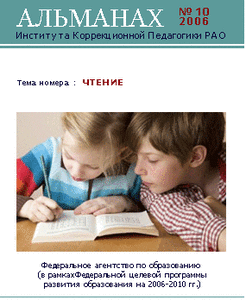Reading
Almanac #10 · · 2006

Understanding Components of Verbal Expression
Extract from the classical paper by Alexander Romanovich is at the intersection of linguistics and psychology. It examines those psychological conditions, which are necessary for proper understanding of the semantics of individual words and sentences.
Keywords
Understanding Components of Verbal Expression
words meaningdecoding of verbal expression
brain damage
On Text Comprehension
The paper is devoted to understanding of the literary text. Understanding of commonly understood meaning and sense are distinguished. Peculiarities and difficulties in understanding of words, phrases and coherent text by children with hearing loss are analyzed in deep.
Keywords
On Text Comprehension
understandingtext
deaf and dumb children
syntagma
speech practice
Reading Abilities in Children with Speech and Writing Disorders
The research is devoted to study of correlation between speech, reading and writing disorders in children, as well as to mutual influence of these types of speech disorders. The article is abundant in experimental examples.
Keywords
Reading Abilities in Children with Speech and Writing Disorders
sound structure of wordssound-letter analysis
alexia
words meaning understanding
Study of Literary Texts Understanding by Mentally Retarded Children (to Help Diagnostics of mental Retardation).
The paper validates possibility of using the results of study of a literary text as a differential diagnostic criterion of mental retardation. Difficulties experienced by children with mental deficiency in perception and understanding of the text are described and analyzed in detail.
Keywords
Study of Literary Texts Understanding by Mentally Retarded Children (to Help Diagnostics of mental Retardation).
oligophreniaunderstanding of the literary text
reference making
level of generalization
Storytelling to Deaf Preschoolers
The paper deals with study of perception of a narrative story by preschoolers with hearing impairments. An approximate plan of work with children, including descriptive stories, is given.
Keywords
Storytelling to Deaf Preschoolers
learning to readtypes of reading
text comprehension
expressive intonation
Book Supplement #1. How to Help the Child with Impaired Vision and Hearing to Become a Reader. Moscow, 1996
The book examines causes of disturbances in reading development of deaf-blind children, it explains why traditional teaching methods could not provide a reliable success in preparing for independent reading in this most difficult category of potential readers. The author reveals an innovative approach to identification, removal and prevention of disturbances in reading development of these children at the early stages of their reading ontogeny. The book presents the course content dealing with directive formation of basic components of reading activity, guidelines for its main sections, organization principles of available reading range for children at the early stages of reading development.
The book is written for specialists working with children with visual and hearing impairments, methodologists and psychologists interested in problems of directive formation of basic components of children’s reading activity.